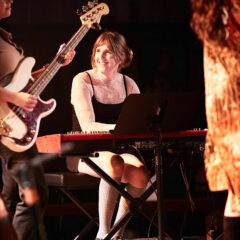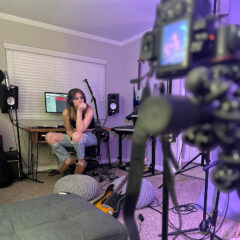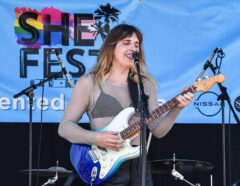Featured Stories
Mariela: A Sanctuary for Rachel Hall

Rachel Hall
It’s a crisp December evening and we’re at a Christmas party. Rachel Hall and I are in deep discussion in the backyard of our friend’s house, bonding over our shared evangelical upbringing. We discuss our journeys through our loss of religious faith and the trauma inflicted on us by our churches. We laugh in mutual horror as we discover our churches put on the same elaborate “scared straight” haunted houses—each room a morality tale told through graphic horror tropes.
Once a musician in a touring worship band, today Rachel finds herself in a very different musical place and not just because she’s a Nashville transplant. Recently, I had the opportunity to pick up on our discussion and we marveled at how much religious trauma has become a trending theme.
Our shared religious anguish seems to be having a moment in the San Diego music scene. Artists like Story & Tune and Flamy Grant have been mining their own religious trauma for a few years now and the term “religious trauma” itself is being tossed around open mic rooms like it’s just a given that we’ve all experienced it. We may be seeing the rise of a new genre here. If so, Rachel Hall fits firmly in that camp of artists exploring their religious pasts through fearless reflection.
“I was raised about as evangelical as they come,” she tells me. I give her my theory about religious trauma as its own genre and she agrees, “Yeah, definitely. I’m going on a tour in the fall literally called the No More Trauma Tour.” For this tour, Rachel plays a utility role as a multi-instrumentalist in the touring bands of the aforementioned Flamy Grant, along with I.V. KiNG.
Rachel plays keys, bass, guitar, and from fifth grade through two years of college, she played alto sax in concert band and marching band. “The eight years I spent playing saxophone in a concert band had a massive impact on me musically. I completely credit my band director and all those concert band experiences for my love for music.”
But when not lending her many talents to playing and touring with others, she’s a powerful songwriter who performs under the moniker of Mariela.
Mariela is Rachel’s indie-pop project with a seven-year catalog of danceable songs, peppered by big choruses reminiscent of the ’80s, ’90s and early aughts synth-pop. But behind the lush, booty-shaking productions we find the heart of a writer coming into her own and finding her voice literally and figuratively through music.

The very source of the Mariela name is based on a sanctuary from the religious and familial rejection that keeps coming up in our conversations. “My band name is actually the name of a woman I lived with one summer in college. The whole story is long and confusing, but basically there was a blog where I referred to a missionary as an extortionist and I got kicked out of a church in Spain one summer during college. I was living with the pastor and when that went belly up a woman named Mariela invited me to live with her and her family. I’m not really sure why I named my band after her. I know at the time I was very inspired by the gender-bending nature of the band Joseph and wanted to do the same. Obviously, there was a bit of foreshadowing there,” she says laughing at this revelation.
Rachel may not have consciously known entirely what she was doing beyond a bit of gender-bending, but as our discussion reveals, it’s not hard to see why she was drawn to naming her band after a woman who gave her literal sanctuary in the midst of a religious crisis. As a former evangelical who discovered herself as a trans-woman, Rachel has a unique relationship with her religious past.
It’s easier to see things in retrospect, but listening through the Mariela catalog there are breadcrumbs that bring you along the journey of Rachel’s life. Her religious background peeps through in threads. In her earliest Mariela release, “Forgetting All We Ever Knew,” she sings in the voice of her former self. “The Gospel says we can forgive each other when the morning comes.” You can hear the early struggles of faith even as she sings about mercy.
Nobody’s winning but we play the game
I can’t admit it
but I need a change
Cause it’s too easy to stay this way…
Run forever
Run forever
— “Cheap Talk”
Her song “Santa Anta” is awash with religious imagery from rosaries to Mother Mary to prayers and confessions. But with the lyric, “The past is set, can’t forget, locked out of the garden,” you can feel the struggle to become herself in a world that would keep her from herself, always threatening to expel her from the Garden. This idea is reprised in “Borrowed Light.”
Darkness creeping up in the garden
I can’t live in the borrowed light
In “Misshapen Shadows,” she sings, “I hope that you do not notice when the lights go out… somewhere deep in hiding” before hitting the big pop chorus, “Open my eyes but I still can’t see. Please wake me up from the in-between… misshapen shadows are following me.”
She explains, “I think thematically I can hear a lot of my own struggles with gender identity in my older songs even though I wasn’t fully consciously aware of how I felt. But yeah, obviously, it’s a big part of what I’m writing. More about processing the rejection from my parents and my ex-wife than the gender itself. That part honestly doesn’t feel that different.”

Rachel in the studio.
Given how vulnerable Rachel is in her lyrics and our interview, I ask her how much she feels her audience has a right to her private life beyond what she reveals on her own terms. “This is actually sort of a problem for me because I’ll play a really vulnerable song and then people come up to me and trauma dump and tell me all about their gay cousin or whatever and want me to go on about how hard life is as a trans person. Or tell me how brave I am or whatever. And I’m like, no. I just gave you more than enough. I don’t really want to engage in this super intimate conversation with a total stranger.”
When I ask how she feels about the responsibility of representing herself as a queer artist, she tells me, “On the one hand, I want to be perceived as an artist, not a ‘queer artist’ or a ‘trans artist.’ But that’s like Taylor Swift saying she doesn’t want to be perceived as ‘vengeful boy-crazy artist.’ The music we write reflects who we are and our values and experiences, so my artistry will always be defined by my unique perspective as a queer person. But I also really wish there were more mainstream trans artists in my genre that I could look to.”
She continues, “When I first transitioned, I was so scared because there really wasn’t a single person I knew personally or even just online whose life looked like something I wanted to have or be. So, in that way, I think it’s really important to put my transness front and center, so other trans people, especially kids, can see there’s a hope and a future with a happy life where you get to be a regular part of society.”
But beyond that, she says, “I don’t feel pressure to write about trans issues or make my artistry all about being trans. I know a lot of people that do, but I honestly don’t really even identify all that much with the identity of being transgender. It’s just sort of a fact about the contrast of the gender I was assigned at birth versus who I actually am. Some trans people are all about their transness as an identity group and I think that’s great for them, but it’s not a major part of my identity.” Her divorce, on the other hand, is ripe for lyrical mining. “Since getting divorced, I can see how much of my relationship trauma I was subconsciously processing through the songs I was writing while we were still together. The only difference now is I’m free to be more honest with myself in the process.”

Rachel performing at She Fest.
Despite the depth of Rachel’s lyrical search for a reconciliation of her past, these themes are usually couched in upbeat productions that make you want to spin beneath a disco ball, hands flung above your head in a sea of writhing bodies. “That dichotomy is very intentional. I’m not great at writing anything except what’s really at the forefront of my mind and what I’m feeling. So that tends to be very personal and kinda heavy. But I love catchy melodies and dancy beats, so I smash them together in a way that I hope people enjoy more than just another slow, sad song.” She takes a beat before adding, “That being said, a lot of my big production does feel like a little bit of self-protection, hiding both my lyrical and vocal vulnerabilities behind big guitars and synths.”
Her most recent release, tentatively titled “Therapist Said,” answers to that vulnerability by stripping down entirely for an unflinching and intimate acoustic reflection of her darkest past, with a powerful and raw vocal delivery, proving her breadth of styles and influences. But it’s been a long road getting here.
“One of the biggest parts of transitioning as a musician is finding your singing voice in a way that feels affirming to your gender identity but also works within the physical limitations of your body and whatever first puberty it experienced.”
When I ask how comfortable she is with her voice today, she is blunt. “I think that’s gonna be a pretty long journey. I’ve always struggled as a singer, so part of the evolution is wanting to continue growing as a singer. But my range has changed a lot and where my voice physically feels comfortable and emotionally as well. So, I imagine it will take a while longer, but that’s kinda partly just being a musician.”
I tell her how much I love the power of her naked vocal as it illustrates the vulnerability of her lyrics in her latest single, “Therapist Said.” She responds with a story about how this vulnerability has hurt her in the past. “One time my ex-wife told me she was embarrassed to be at an open mic with me because my singing was so bad. So, I definitely have some demons in my head when I sing.”
Demons aside, her latest single may be the most powerful work she’s done, and her voice supports it perfectly. “I do feel good about my voice on this one and it’s really the first thing I’ve ever released with vocals this exposed. It feels really scary. It’s a huge departure.”

Rachel is a self-produced artist who largely controls how much cover and how much vulnerability she shares with us. But she’s quick to describe her work as a collaborative process. “Most of my music is a group effort. Usually, I write and produce most of the parts myself at home and then send it to my friend and longtime band mate Tommy Nixon back in Nashville and he adds more production ideas. Sometimes I’ll have Jules Stewart record live drums and sometimes we will just keep the drums programmed. Then we send it to my friend Luke Gibson who adds his touch of guitar on top.”
But she’s not just producing her own project and developing her own voice, she’s helping other artists find their voices as a producer with a growing list of artists who’ve worked with her. “I’ve been recording people, generally a couple sessions a week. I’ve already got a few credits out there right now; I think six artists in San Diego so far. Jeni McElrath’s latest single [“Anyone Would” by her band Mostly Sunny] and Beth Richards and Noa Martucci [and] a handful more out in the coming weeks, including Hailey Wetzel. I just started doing it ‘full time’ since I left the corporate world back in January.”
She’s currently working with Kael Cabal, who is enthusiastic in singing her praises. “What first drew me to working with Rachel was her style of music, but she”s in the know with other genres from my formative years such as adult contemporary, folk, Americana, and bluegrass…her experience mentoring and collaborating with up-and-coming artists showed as we worked on recording my song, “On the Abstract of Being Brave!” I had the chords, lyrics, and feeling for the song, but she fleshed out everything else to capture a pensive yet energetic feeling: the bass, piano/organs, drums, and then some! I really appreciated her insight as we worked on my song as she provided her input based on her encyclopedic knowledge of music to bring it to life. Rachel is inviting, adaptable, and well-versed, and it’s my pleasure to continue to work with her.”
Kael certainly nails everything that I’ve grown to know about Rachel Hall. It’s exciting to see an artist grow this much in real time. To see a fearless search for a voice coming into its own and transcending the trauma of her religious and familial past. The journey of Mariela is deep but dance-inducing. And when the dancing is done, Rachel is unflinching in her reflection, evidenced clearly in her latest single, “Therapist Said.” As much as I want to take a deep dive into the lyrics with Rachel, I tell her honestly that I think it’s such a perfect song, I don’t want to demystify it. Journalism be damned, I’m letting this one speak for itself. So, I’ll simply post the lyrics in their entirety and urge you to find it on Spotify.”
My therapist said maybe we should take a break
but we were right to be afraid of what could happen in that space
I wrecked my car just an hour into the drive
out to Austin on the edge of the night
praying to God that I would see the light
Well I cried every tear I had across the bridge into Memphis
we were between jobs, I couldn’t pay for my prescription
Oh, you never let me come back home
Oh, you never let me come back home again
Nena’s mom took me out to pierce my ears
rail thin shaking with fear
afraid of looking in the mirror
maybe if I tried her on, then I could take her off
but the real me made your stomach turn
it’s a lesson that I can’t unlearn
Well I cried every tear I had across the bridge into Memphis
we were between jobs I couldn’t pay for my prescription
Oh, you never let me come back home
Oh, you never let me come back home again
No matter how hard I tried to make amends
Oh, you never let me come back home again
My therapist called the Little Rock police
she knew I was danger driving, looking for some relief
You said I could stay on your sister’s couch
work was so busy and you didn’t have the time to talk it out
Well I cried every tear I had across the bridge into Memphis
we were between jobs I couldn’t pay for my prescription
Oh, you never let me come back home
Oh, you never let me come back home again
No matter how hard I tried to make amends
Oh you never let me come back home again.
—from “Therapist Said”
I’ve mentioned several times in this interview how much I love this song and the vocal delivery. It perfectly encapsulates the recurring themes of religious trauma, family rejection and finding herself within her music. Listening to this song on repeat, I only want to tell Rachel one thing. You are home. And your voice is perfect. The phrasing. The timbre. The intensity without being overwrought. Perfect. Mariela is home.
Listen to “Therapist Said” and I’m certain you’ll agree. Then dig into her dance songs and celebrate an artist who has found her sanctuary in the realm of Mariela.










